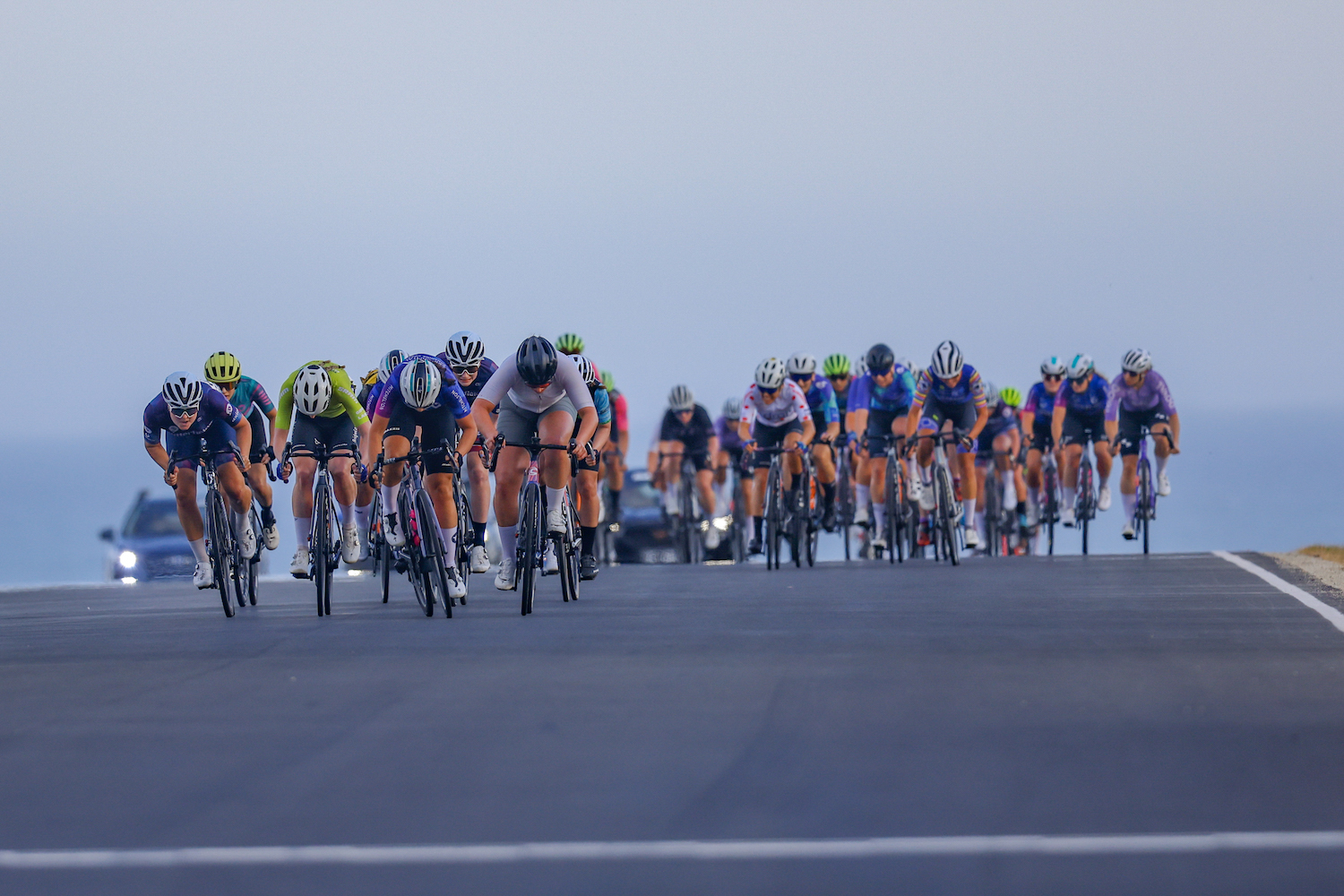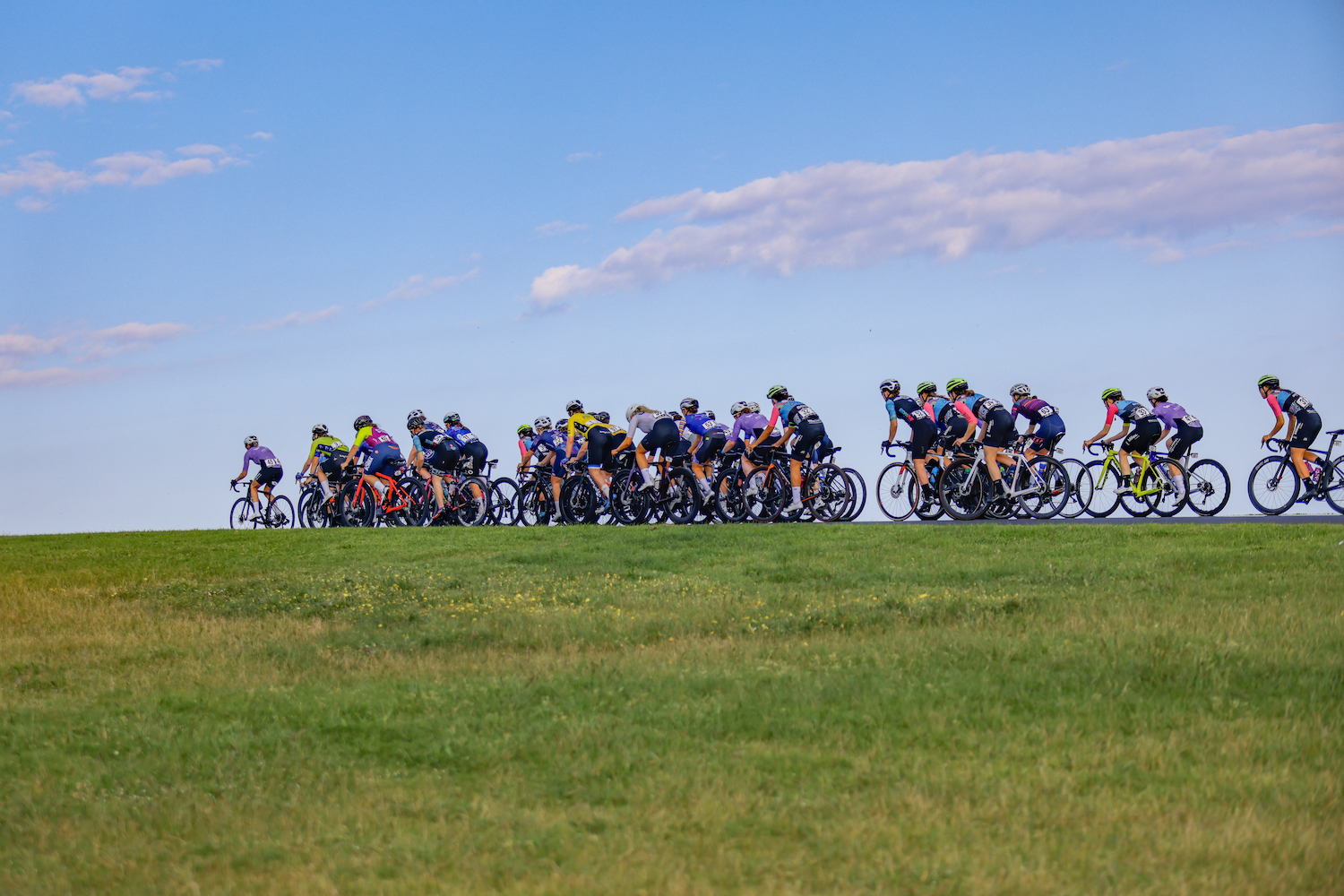
This is the second of two interlinked features on Australia's domestic race scene, if you want to read the first before delving into this one see End of an era – Final sign off for Australia's National Road Series at the Tour of Gippsland
As the final chapter of AusCycling’s National Road Series (NRS) played out at the recent Tour of Gippsland, there was a clear and visible reminder that while the sun was setting on one of the institutions of the nation’s domestic cycling scene, a new beginning would soon dawn for racing in Australia.
The ProVelo Super League sun shelter was perched as an unmissable feature near the finish line of the Phillip Island Grand Prix track, a symbol of the future of the sport during the last gasp of the series that had once shone a warm spotlight on the Australian scene.
There was little doubt something had to shift and the March announcement of the ProVelo Super League changed everything as it promised a private equity-funded series, founded by Matt Wilson and Aaron Flanagan, with the perennial white knight of Australian cycling Gerry Ryan once again stepping up to help make it a reality.
“It's an exciting prospect, what the future can hold and how we're going to do it differently,” Wilson told Cyclingnews, however acknowledging that there was also a tinge of sadness as he stood on the sidelines of the final race of the old series.
“We're really, you know, standing on the shoulders of the NRS a bit with what we're trying to do. We're trying to emulate what they've been able to achieve in terms of the road to the WorldTour and get that pathway that has been provided for Australian riders through that system.”
A pathway that once existed and helped launch a long list of riders to the WorldTour but one that is now looking decidedly broken – thin on races, thin on fields, thin on sponsorship and thin on teams.
“It's a rebuild,” Wilson, the co-founder of the new series, said.
“We've got something fresh and new, and the investment from Gerry has been incredible, what an opportunity for Australian cycling to have that much re-investment into domestic cycling. I think it'll show dividends – we have just got to get it up and running.”
That, however, is no simple task.
'We've got to prove it!'
Change is never easy and Wilson wasn’t going to pretend it was all sunshine and lollipops.
"It's been a lot of work, it's been a lot of work," said Wilson, doubling up to emphasise just how much effort has gone into trying to bring people along on the journey and convince them to make the "leap of faith" required to get behind a new plan.
"I mean, the Australian cycling community can be quite negative about things and quite dismissive of anybody who tries something new ... and that's fine. We've got to prove it! We're going to show what we can do and that we're different."
Some may have become jaded and wary, as the reviews and meetings of the past have not stopped the decline of the once thriving National Road series. The hope is that the final year of the NRS is a case of it being darkest before the dawn, with the shards of light now beginning to shine through.
“We knew it was going to be tough to get a whole new race series up from scratch in less than one year,” said Wilson. “And to be honest in many ways we're further along than we thought we would be.”
The have been a myriad of details unfolding, event announcements have been coming thick and fast, with the first of the six races to start on the 18th of January in Adelaide and the series to finish on March 23 in Queensland. Live broadcasts on SBS have also been flagged and there is the tantalising prospect of a direct move to the professional cycling world with stagiaire contracts at Jayco AlUla and Liv Jayco AlUla for the winners.
Many things are falling in to place but at the same time others just haven't been slotting in as planned.
“There have been challenges. Sponsorship is very slow, and we're definitely trying to progress on that side, but we're probably behind where we'd like to be on the sponsorship side," said Wilson.
"It's the hardest climate to have tried to start something. We're bordering on a recession in Australia, and people don't want to spend money and we're something new, so there's a lot of challenges against us on that side. So that has been tough, but the events have been fantastic.”

A perfect storm
The impact of the tough economic climate has been pretty clear of late.
There has been the double hit of a ramp up in inflation over recent years in Australia which has delivered rising costs across the spectrum – right from event expenses for organisers to travel costs for teams – and the rate of Gross Domestic Product growth in 2023-24 was the weakest it has been (with the exception of during the COVID-19 pandemic) since 1991-92.
That has meant that sponsorship is thinner on the ground with even some of the most avid of cycling supporters having to pull back.
The consequence? The perfect storm. From the governing body to the teams, the fall out of the brutally tough climate are clear.
AusCycling made the decision to hand over the reins of the national series on the back of a 2023 where it delivered a net loss of A$1.9 million, attributed in its annual report to soaring insurance costs.
Then as the 2024 season progressed, word started to filter out that some of the key teams would no longer be part of the senior ranks of the top-tier of domestic racing.
Notably BridgeLane – with its rich legacy in supporting key Australian cycling talent – will not run its Continental men’s squad in 2025, though the women’s team is continuing on.
ARA-Skip Capital too has altered its focus, switching attention from Under 23 riders amid the “global economic pressures” and instead morphing into an Under 19 development team.
That means the League, which flagged an ambitious target of 30 teams when it launched, has had to approach things a little differently for its opening season to weather that perfect storm. Wild card entries have become a far more prominent part of the mix than initially anticipated.
"As it turns out, we're going to have a lot of wildcard entries," said Wilson when Cyclingnews spoke to him at the start of the month.
"I thought maybe there'd be 10% wildcards, maybe now it'll be 40% wildcards."
Wilson said that also included internationally-based riders as well, with the compact calendar and stagiaire contracts that are on offer a significant draw.
"I think it'll be a really competitive field," said Wilson.
"I'm really excited and I think once it's built, people can see the value, and they can see the great broadcast that we've got and the great events that we've got, and the sponsors start to get more attracted back to the sport, those teams will grow again."
Pieces of the puzzle
The falling away of the teams in recent years, but optimism there will still be strong individual riders that want to step in and round out the field highlights another issue – ProVelo is but one piece of a larger puzzle.
The slogan of the ProVelo Super League emblazoned across the website is ‘Road to the WorldTour’ but for that road to deliver a substantial amount of traffic there needs to be a pipeline to it as well.
“If they are not inspired at grass roots to get to the next level, it’s gone," said Bendigo and District Cycling Club Vice President Darren Casey, who is also heavily involved in a number of key races in the state.
"If grass roots dies, cycling dies.”
One of the club's WorldTour alumni, Jack Haig (Bahrain Victorious), is a perfect example of the importance of the steps along the way, jumping from mountain bike racing, to club racing, to a spectacular win on the Mt Hotham stage of the state series race of the Tour of Bright – still a staple of the calendar – and then jumping to the NRS on his way to a Jayco development team and ultimately the WorldTour.
"Cycling clubs are where everyone starts and the club racing is where you learn how to race," the then 19-year-old Haig told Bicycling Australia in an interview from 11 years ago.
"Without them there wouldn’t really be a very big cycling/racing scene."
The club and state series races become perhaps even more important with the new league. Firstly. elevating the standard and competition to bridge the gap to the professional ranks also means opening up the gap to the rest of the domestic scene if it doesn't rise too.
Secondly, one of the sought-after benefits of the compact calendar is that it would allow riders to race in Australia but then also pursue opportunities elsewhere through the rest of the season, with many of the nation's best heading for a stint in Europe or the United States to try and boost their opportunities and experience. This, however, means that there is a long stretch of the year for those that remain at home where that top level of domestic competition just doesn't exist.
The hope, however, is that it is a void that can be filled.
"There is not much if you are aspiring to take that next level so what are you going to do between when ProVelo finishes in March and January?" said long-time Tour of Gippsland race director, Karin Jones who has also been involved shepherding an extensive number of key domestic races and is set to be the event technical director at ProVelo Super League.
"There is a real opportunity there to create another series of some kind."
A televised and captivating national series could indeed help push interest at the grass roots level as well but the current reality is that event organisers across the board are also battling the same cost and sponsorship headwinds.
The health of the grass roots is a piece of the puzzle outside ProVelo Super League's boundary that will likely be an influence. However, as Wilson mentioned earlier, there is one particular puzzle piece within its boundary that is taking considerable focus to locate.
"Sponsorship is probably the biggest piece that needs to fall into place," said Wilson.
"We need support. People in the cycling community out there, they're involved in big companies and business, and they're sort of sitting on the fence and wondering if they should or if they shouldn't.
"This is an awesome opportunity to own something from the ground up and to build it with us and grow with us ... this is something different, but also a fresh start for Australian cycling.
"So let's be positive. Let's get behind it. Let's make it work."







